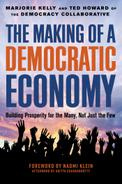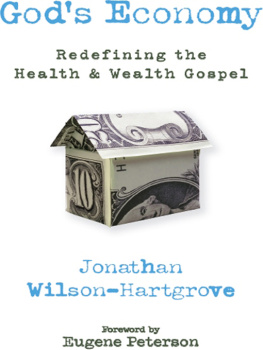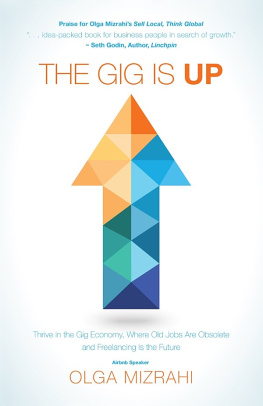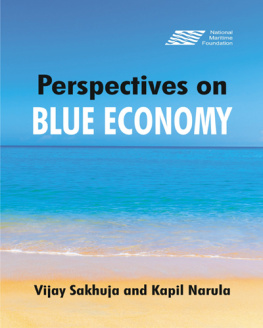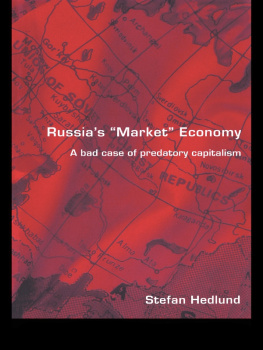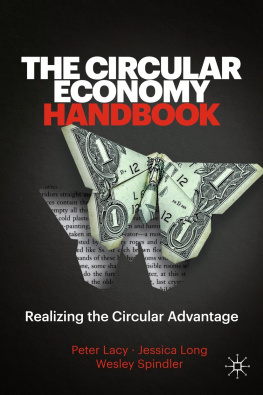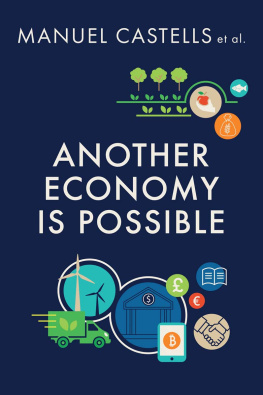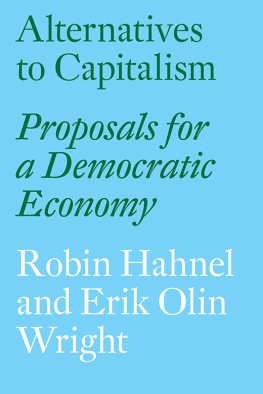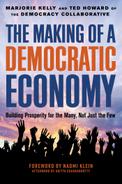Praise for The Making of a Democratic Economy
Kelly and Howard offer the insight that our democratic principles and our economic vitality dont need to be in constant contradiction. For the future health of our planet and its citizens, we need to democratize our market-driven economy by creating ownership structures that, by their very nature, lead to more sustainable, generative outcomes. This powerful book shines a light on the practical paths so many are searching for today.
Dan Wolf, CEO, Cape Air, and former Massachusetts State Senator
We call The Laura Flanders Show the place where the people who say it cant be done take a backseat to the people who are doing it. Howard and Kelly bring us dispatches from places like that all across the United States, where people are democratizing the economy and shifting power. This important survey, from two who have been instrumental to much of this work, paints a picture not simply of a mosaic of experiments but of a newly emerging system that lies within our reach. Can we change our culture to cherish people over capital? It wont be easy, but it can be done. We need deep long-term thinking and immediate action steps. Lucky for us, this deeply considered book offers both.
Laura Flanders, Host and Executive Producer, The Laura Flanders Show
Marjorie Kelly and Ted Howard remind us that its not enough to fight against an unjust and unsustainable systemwe also have to have a vision for the system we want instead and a plan for building it. The stories they tell in The Making of a Democratic Economy lift up the hard and vital work of the people creating the institutions of the next economy.
Kat Taylor, cofounder and CEO, Beneficial State Bank
As champions of worker and community ownership, Kelly and Howard remind us that economic democracy is essential to political democracy and a viable human future.
David Korten, author of When Corporations Rule the World and Change the Story, Change the Future
This book offers a practical path of radical hope for system change. Models like those here are being copied across the world. Scores of the ideas here make clear sense, like having the Federal Reserve bail out the planet the same way it bailed out the big banks. If youre looking for a mix of mind-expanding vision with ideas and models that are working and ready to be tried in your town, this book is for you.
Kevin Jones, cofounder of Social Capital Markets and The Transform Series
This is an important book. It builds on growing recognition that systemic transformation is needed, providing a road map to understanding that democracy is at the core of building flourishing economies needed for a flourishing future. We all need to deeply learn from the many examples and lessons of this book and work together to create whole systems change. The Making of a Democratic Economy provides an invaluable guide to how that can happen.
Sandra Waddock, Galligan Chair of Strategy, Professor of Management, Boston College
Marjorie Kellya huge influence for me as an impact investor and activisthas given us another gem, on the critical need for democracy not just in our political system but in our economy.
Morgan Simon, Founding Partner, Candide Group, and author of Real Impact
The call for an economy that works for all is heard in Washington and even on Wall Streetbut how will the change take place? Marjorie and Ted offer a map. They share stories of a different kind of enterpriseone that puts the human interest at the heart of success. These community-based enterprises are not only hopeful but replicablethey illuminate the design for an economy that honors our democratic ideals.
Judith Samuelson, Executive Director, Business and Society Program, The Aspen Institute
Marjorie Kelly and Ted Howard have given us the road map toward economic democracy. But they dont just show the interstates and the major landmarksthey show the byways and small towns where real change comes from. In this moment when greater and greater numbers of people are realizing that the rules of capitalism must be rewritten, the stories in these pages, and the strategies that Kelly and Howard share, will guide our way forward.
Lenore Palladino, Assistant Professor of Economics and Public Policy, University of Massachusetts Amherst; former Vice President for Policy & Campaigns, Demos; and former Campaign Director, MoveOn.org
THE MAKING OF A
DEMOCRATIC
ECONOMY

The Making of a Democratic Economy
Copyright 2019 by Marjorie Kelly and Ted Howard
All rights reserved. No part of this publication may be reproduced, distributed, or transmitted in any form or by any means, including photocopying, recording, or other electronic or mechanical methods, without the prior written permission of the publisher, except in the case of brief quotations embodied in critical reviews and certain other noncommercial uses permitted by copyright law. For permission requests, write to the publisher, addressed Attention: Permissions Coordinator, at the address below.

| Berrett-Koehler Publishers, Inc.
1333 Broadway, Suite 1000
Oakland, CA 94612-1921
Tel: (510) 817-2277, Fax: (510) 817-2278
www.bkconnection.com |
Ordering information for print editions
Quantity sales. Special discounts are available on quantity purchases by corporations, associations, and others. For details, contact the Special Sales Department at the Berrett-Koehler address above.
Individual sales. Berrett-Koehler publications are available through most bookstores. They can also be ordered directly from Berrett-Koehler: Tel: (800) 929-2929; Fax: (802) 864-7626; www.bkconnection.com
Orders for college textbook/course adoption use. Please contact Berrett-Koehler: Tel: (800) 929-2929; Fax: (802) 864-7626.
Distributed to the U.S. trade and internationally by Penguin Random House Publisher Services.
Berrett-Koehler and the BK logo are registered trademarks of Berrett-Koehler Publishers, Inc.
First Edition
Hardcover print edition ISBN 978-1-5230-9992-4
PDF e-book ISBN 978-1-5230-9993-1
IDPF e-book ISBN 978-1-5230-9994-8
Digital audio ISBN 978-1-5230-9996-2
2019-1
Book producer and text designer: Maureen Forys, Happenstance Type-O-Rama
Jacket design: Rob Johnson, Toprotype, Inc.
Cover image (hands): PA Images
TO GAR ALPEROVITZ
CONTENTS
FOREWORD
I n moments of crisis, when the system around us stops working, cracks in our understanding appearwe come unmoored, unable to explain how the world works and indeed what our place in it is. But these gaps dont stay empty for long. Fear, dividing and turning us against each other, rushes in to fill the cracksunless we can fill them with hope first.
Hope is what makes it possible to just say more than no in times of crisis. Dont get me wrong, saying noto the rise of oligarchs and authoritarians around the globe, to the cages at the borders, to a rapidly accelerating climate crisisis a moral imperative. But hopecredible hope, grounded in vision and strategyis what turns reactive movements into transformative ones. We need to know what we are

